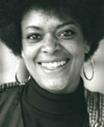
Toni Cade Bambara
Georgia Connections
- Atlanta, Fulton County
Notes of Interest
Toni Cade Bambara moved to Atlanta in 1974 and became a visiting professor at Emory University, a teacher at Atlanta University and writer-in-residence at Spelman College. While in the city, she co-founded the Southern Collective of African American Writers and was an outspoken activist in behalf of the struggle for civil rights and of equality for women. She wrote short stories and novels and was also a filmmaker who died in 1995 of cancer.Toni Cade Bambara was born March 25, 1939 in New York City. She took the name "Bambara" after discovering it on a sketchbook in a trunk belolnging to her great-grandmother. She grew up in Harlem and developed an interest in the black liberation and the women's movement, which led her to publish an anthology including some of her stories in 1970, "The Black Woman." That book brought together poetry, essays and stories by a gifted group of writers including Audre Lorde and Alice Walker. Another anthology, "Tales and Stories for Black Folks," followed in 1971. She published two acclaimed collections of short stories, "Gorilla, My Love" in 1972 and "The Sea Birds are Still Alive" in 1977 which earned her critical praise. Her first novel, "The Salt Eaters," appeared in 1980. A second novel, "Those Bones Are Not My Child," was edited by Toni Morrison and posthumously published in 1999. Critically received better than "The Salt Eaters," it dealt powerfully with the real-life disappearances and murders of some 40 black children in Atlanta between 1979 and 1981. She worked on several film documentaries on subjects as varied as John Coltrane and W.E.B. Du Bois, and in 1986 won a Best Documentary Academy Award for "The Bombing of Osage Avenue, a project for which she was writer and narrator.
Her work spoke sometimes with pride, sometimes with anger in behalf of African American culture and history, and her writing was often political in nature whether focusing on issues of racial awareness or feminism. Bambara's "is one of the earliest voices in contemporary African American literature to call intentionally into tension the questions of race and gender."
